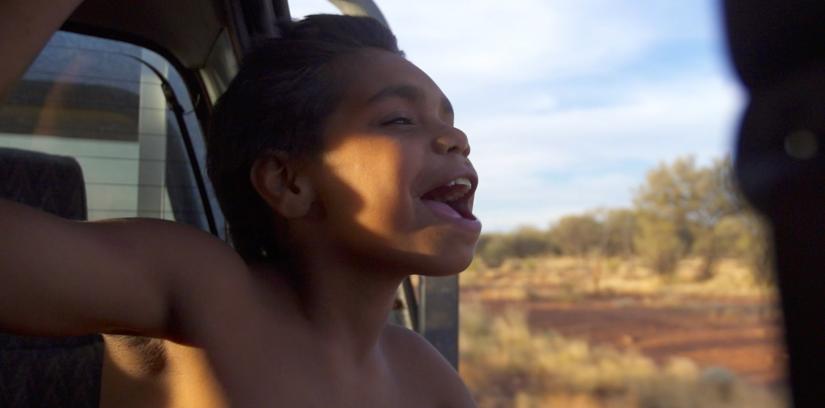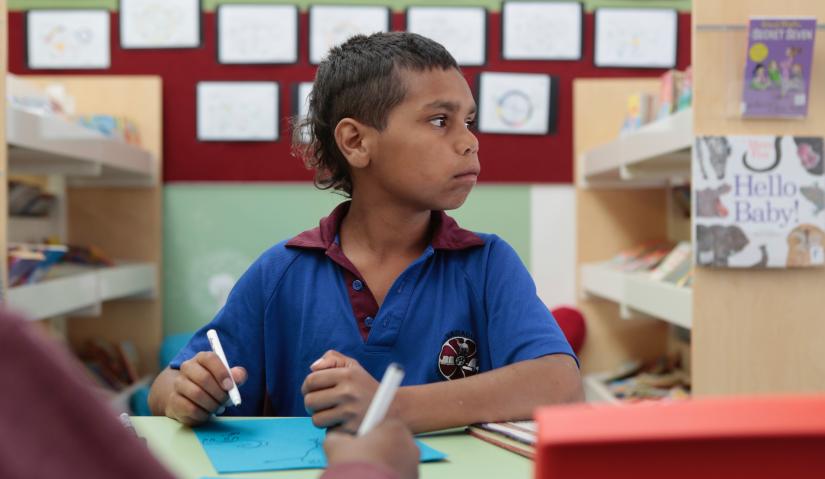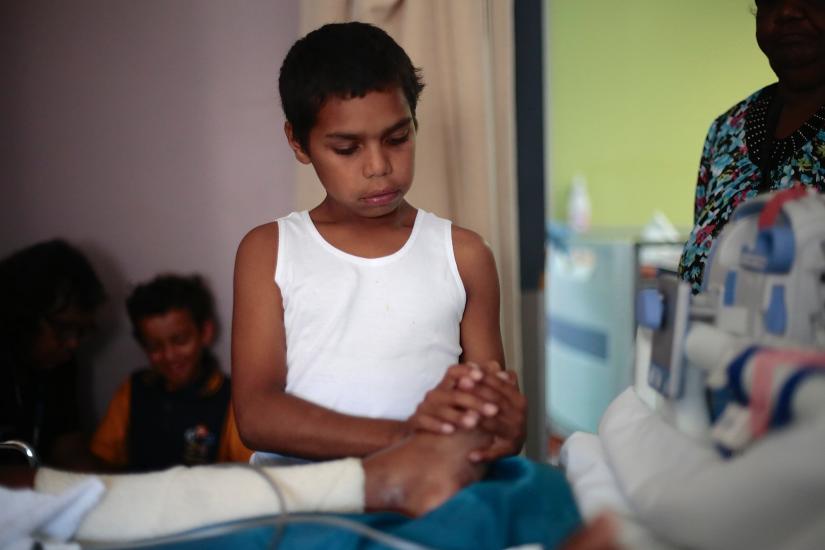“What I want is a normal life, of just being me and what I mean by me is, I want to be an Aborigine”. For 10-year-old Arrernte/Garrwa boy, Dujuan Hoosan, ‘normality’ is a pipedream.

Dujuan, who was born and raised in Alice Springs, spends his school days learning lessons that largely ignore his Indigeneity, while at home he’s revered as a child healer. Described by his great grandmother Margaret Kemarre Turner as “a young doctor, a trainee who can recognise what is in the body,” a gift given to him by his Country and grandfather after he passed.
He’s also the star of alumna Maya Newell’s film, In my blood it runs. The politically charged and seeringly honest documentary, chronicles what it’s like to grow up as a First Nations child in Australia.
Launched in Australian cinemas in February, the movie’s narrative exposes the current state (and failings) of Australian education, welfare, juvenile justice and culture, and offers many parallels to current global conversations around racial inequality.
Most importantly, it shows the strength and resilience of Dujuan and his family and how they tirelessly work to keep their son safe and educated in language, culture and identity. As Dujuan’s mother, Megan Hoosan, explains, “I want Australia to know that we love and care about our kids”.
When Maya met Dujuan
The story started a decade ago when Maya was invited by Arrernte Elders in Alice Springs to film the work of two non-government organisations (NGOs), Akeyulerre Healing Centre and Children's Ground. Both aim to educate Indigenous children about their heritage by taking them out on Country to ground them in culture and language. These relationships built the foundation of the film, and their backing and guidance throughout the making was integral to the intimacy that we experience onscreen.
It was there that Maya met Dujuan. Like many of his friends, Dujuan speaks multiple languages and is confident on his homelands, yet feels like a failure at school. “It’s no surprise,” explains Maya, “they’re taught in English and measured in western values.”
So, when Dujuan suggested Maya make a film about him, Maya quickly agreed. “He’s such an intelligent, cheeky kid who has a beautiful way of viewing the world around him.” And, by telling Dujuan’s story Maya knew it would be “an amazing conduit to help audiences better understand what it feels like to grow up as a First Nations child navigating the Australian education system, welfare system and juvenile justice system.”
“International evidence shows that children do better when they learn through their first language and culture as the foundation. We should have a system that ensures First Nations children can access education in their own language and culture, which is what every other kid in Australia already has, and one that recognises education systems that have existed for over 65,000 years,” Maya explains.
As Dujuan’s grandmother Carol Turner, explains, “White people educate our kids in the way they want them to be educated. But I want them to learn their language. So they can carry on their language. I want my children to grow up learning in both ways”.
This is a message that Dujuan has taken all the way to the United Nations.

Addressing the world stage
"I came here to speak with you because the Australian Government is not listening. Adults never listen to kids like me but we have important things to say.
“There are some things I want to see changed. I want my school to be run by Aboriginal peopIe. I want adults to stop cruelling [sic] 10-year-old kids in jail. I want my future to be out on land with strong culture and language. My film is for all Aboriginal kids, it is about our dreams, our hopes and our rights. I hope you can make things better for us.”
This is what Dujuan told the 42nd session of the United Nations Human Rights Council when he became one of the youngest people to address the Council in Geneva in 2019 after completing the movie.
Justice reform
At present, Australia has one of the youngest ages for criminal responsibility in the western world. It means that children as young as 10 can be sent to prison – four years younger than the International human rights standard.
However, evidence shows children who spend time in prison are not only traumatised by the experience but are more likely to get into trouble with the justice system later in life. It’s a vicious cycle that not only reinforces negative stereotypes, but sets many Indigenous children up for failure, as evidenced by statistics which show that young Indigenous people are 17 times more likely to end up in detention than other Australians.
Where to from here?
Since its debut in February, In my blood it runs has received an overwhelmingly positive response on both a national and international level. The film’s accolades not only include a screening in Parliament House, but its recent selection as the New York Times ‘critics pick’.
Additionally, Dujuan’s family with support of the film team and impact partners are continuing to drive important conversations via a grass roots campaign that allows workplaces and schools to host their own screenings of the film. (Between Sunday 5 July and Tuesday 4 August 2020, you can also watch In my blood it runs for free on ABC iView).
“Overall,” explains Maya, “audiences have expressed a general sense of incredible privilege to be able to walk alongside Dujuan and experience that child’s eye view of the world – something that’s so often missing from our mainstream public debate.
“First Nations communities have the solutions to many of the issues raised in the film and they should be given the agency – they just need people to listen to them.”

Want to learn more?
In my blood it runs was produced by a mixed First Nations and non-First Nations crew who include UTS Professor Larissa Behrendt, Rachel Naninaaq Edwardson, Sophie Hyde, Maya Newell in collaboration with those onscreen; Dujuan Hoosan, Megan Hoosan, Carol Turner, James Mawson, Margaret Anderson and Advisors; Margaret Kemarre Turner, Mrs Abbott Perulle, Amelia Turner, William Tilmouth and Executive Producer Felicity Hayes.
Visit the In my blood it runs website to find out more about how to take action on their campaign for change, use education resources and how you can watch the film or host your own screening.

